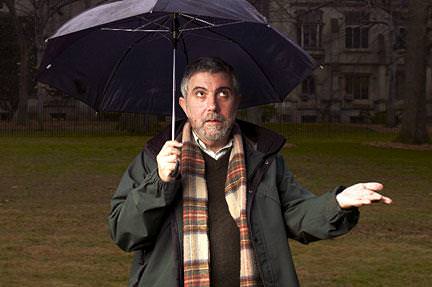As some of us keep trying to point out, the United States is in a liquidity trap: private spending is inadequate to achieve full employment, and with short-term interest rates close to zero, conventional monetary policy is exhausted.Un-freaking-believable. How in the world does this man seriously have a Nobel Prize in economics? The best way to refute this idle resource garbage is to ask a few questions:
This puts us in a world of topsy-turvy, in which many of the usual rules of economics cease to hold. Thrift leads to lower investment; wage cuts reduce employment; even higher productivity can be a bad thing. And the broken windows fallacy ceases to be a fallacy: something that forces firms to replace capital, even if that something seemingly makes them poorer, can stimulate spending and raise employment. Indeed, in the absence of effective policy, that’s how recovery eventually happens: as Keynes put it, a slump goes on until “the shortage of capital through use, decay and obsolescence” gets firms spending again to replace their plant and equipment.
And now you can see why tighter ozone regulation would actually have created jobs: it would have forced firms to spend on upgrading or replacing equipment, helping to boost demand. Yes, it would have cost money — but that’s the point! And with corporations sitting on lots of idle cash, the money spent would not, to any significant extent, come at the expense of other investment.
- If increasing the cost of doing business drives economic growth, why doesn't the government just force increased safety regulations on everything? That way businesses will have no choice but to spend money!
- How does Krugman know that business can afford to upgrade themselves to meet these new standards?
- If these new regulations end up forcing some businesses to close, well than that didn't create jobs now did it?
- If new regulations promote efficiency so well and will lead to higher profits, why are businesses not implementing them already since they are greedy capitalist pigs?
What Krugman, being the joke of an economist he is, seems to preference is government dictating the creation of jobs despite their sustainability. So hypothetically,if the government does force businesses to adopt new emission standards, they will have to spend money to update their infrastructure. But what happens once this updating is complete? Sure, those who produced the goods for the businesses to update their facilities may have experienced an increase in demand, but once the renovations are complete, that demand vanquishes.
The real question to ask is what would the business have spent the money on if they didn't have to update their facilities? The possibilities are endless, yet Krugman never acknowledges such arguments. He sees a supposed lack of spending by business and wants the government to force them to spend money. Damn the other possibilities!
So going by his logic, here is my plan to jump start the economy. Since Krugman is so big on public works, how about he voluntarily buries himself 10 feet below ground in a metal bunker somewhere in America and then the government can pay workers to search for and dig him up. Imagine all the jobs that could be created! Imagine the now open column space in the New York Times editorial page!
Sorry for the ramble there, but Bastiat's broken window fallacy still holds during the "liquidity trap." We live in a world of scarce capital, all capital serves a purpose whether it be idle or not. Bureaucrats forcing the use of resources when their livelihood doesn't depend on profit or loss leads to inefficient use.
Bastiat-1
Krugman-0
Now after that long rant, it looks like China is proving Krugman's wacky theory of Glenn Beck driving the rise in the price of gold dead wrong. Via Zerohedge/Wikileaks:
Now of course I have been covering China's accumulation of gold, as every respectable financial news analyst has, but facts aren't invited to Krugman's argument.CHINA'S GOLD RESERVES"China increases its gold reserves in order to kill two birds with one stone""The China Radio International sponsored newspaper World News Journal (Shijie Xinwenbao)(04/28): "According to China's National Foreign Exchanges Administration China 's gold reserves have recently increased. Currently, the majority of its gold reserves have been located in the U.S. and European countries. The U.S. and Europe have always suppressed the rising price of gold. They intend to weaken gold's function as an international reserve currency. They don't want to see other countries turning to gold reserves instead of the U.S. dollar or Euro. Therefore, suppressing the price of gold is very beneficial for the U.S. in maintaining the U.S. dollar's role as the international reserve currency. China's increased gold reserves will thus act as a model and lead other countries towards reserving more gold. Large gold reserves are also beneficial in promoting the internationalization of the RMB."
Sorry to ragging on Krugman (I'm honestly not), but check out what these two guys from Britain think of his favorite department store:
I can only imagine Krugman's reaction to such low class products like Oscar Mayer "ham and cheese" slices or frozen "pizza and cookies" meals. I am sure most ivory tower academics are disgusted at such products which should give you a clue to their legitimacy.
In another wonderful video, Don Boudreaux tears apart the idea that the government should have a hand in determining whether T-Mobil and AT-T merger:
I will end with a nice cartoon on an industry Krugman wishes the government would spend more to promote:
If you want to see how disastrous government financing for green energy is, just take a look at Solyndra.
Update- Watching ABC's This Week, according to Paul Krugman, "the public should want what I want, but it doesn't." Yes Dr. Krugman, you are right, the uninformed, ignorant public is wrong, and if you were dictator we would all have good jobs digging ditches and filling them up again.


Tidak ada komentar:
Posting Komentar